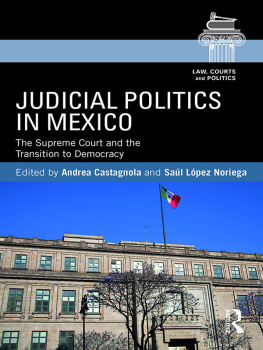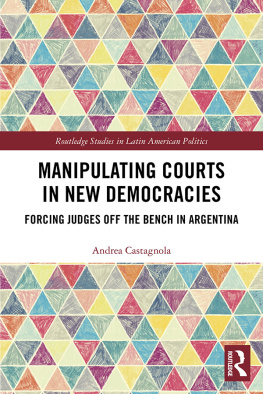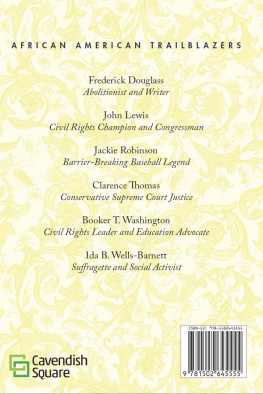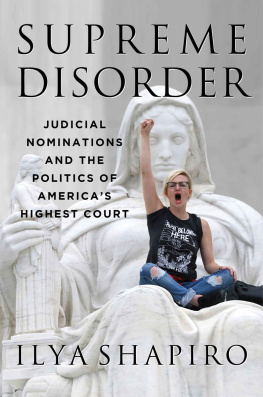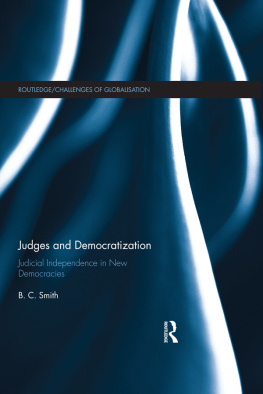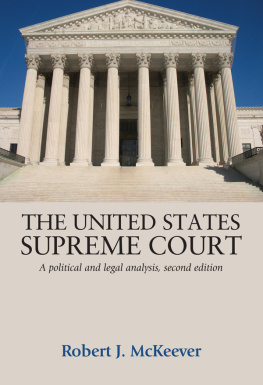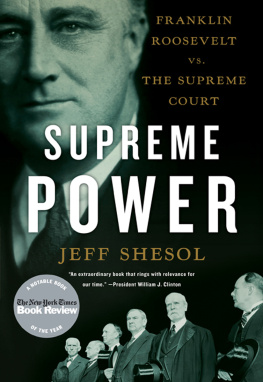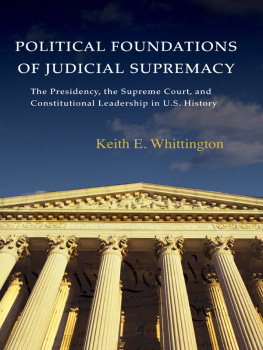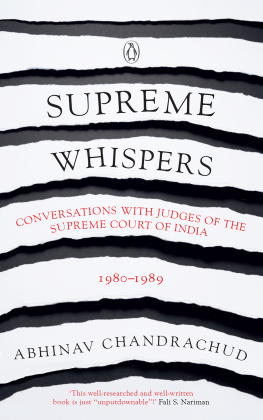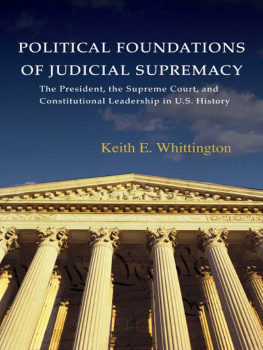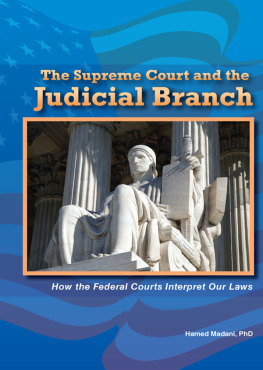This book extends the boundaries of our understanding of the evolving role of the Court in the political evolution in Mexico from 1917 to the more recent process of democratization in this country. Throughout all of the authors contributions, this work is a fine-grained analysis that permits us to understand the institutional changes in the Supreme Court and in its relations to other sociopolitical actors. Employing a wide collection of methodologies and theoretical approaches, the authors contribute in a remarkable way to elucidate not only the Mexican case but also the role of the courts in the dynamics of democratization from a comparative perspective. Indeed, this book is an exciting new contribution for scholars of Mexico and for others interested in the field of comparative judicial politics. To be sure, this edited book will be a useful toolkit for lawyers and political scientists, and for professors and students.
Rodolfo Sarsfield, Universidad Autnoma de Quertaro
Rodolfo Sarsfield, Universidad Autnoma de Quertaro What role does the Mexican Supreme Court play in democratization? This collection answers this question by examining mechanisms by which the court has become empowered and activated throughout the consolidation phase as well as the courts decision-making logic and impact on Mexican democracy. It combines qualitative and quantitative analysis, novel data collections, and a host of perspectives into fresh insights on this emblematic case. The result is a compelling analysis that makes a theoretical contribution with practical implications for institutional design.
Ryan Carlin, Georgia State University
Judicial Politics in Mexico
After more than seventy years of uninterrupted authoritarian government headed by the Partido Revolucionario Institucional (PRI), Mexico formally began the transition to democracy in 2000. Unlike most other new democracies in Latin America, no special Constitutional Court was set up, nor was there any designated bench of the Supreme Court for constitutional adjudication. Instead, the judiciary saw its powers expand incrementally. Under this new context inevitable questions emerged: How have the justices interpreted the constitution? What is the relation of the court with the other political institutions? How much autonomy do justices display in their decisions? Has the court considered the necessary adjustments to face the challenges of democracy?
It has become essential in studying the new role of the Supreme Court to obtain a more accurate and detailed diagnosis of the performances of its justices in this new political environment. Through critical review of relevant debates and using original data sets to empirically analyze the way justices voted on the three main means of constitutional control from 2000 through 2011, leading legal scholars provide a thoughtful and much needed new interpretation of the role the judiciary plays in a countrys transition to democracy.
This book is designed for graduate courses in law and courts, judicial politics, comparative judicial politics, Latin American institutions, and transitions to democracy. This book will equip scholars and students with the knowledge required to understand the importance of the independence of the judiciary in the transition to democracy.
Andrea Castagnola is a Post-Doctoral Fellow in the Comparative Politics Department at the University of Bergen and is Assistant Professor at FLACSO-Mexico. Her research focuses on judicial politics in Latin America and comparative politics.
Sal Lpez Noriega is Associate Professor at the Centro de Investigacin y Docencia Econmica (CIDE). He teaches courses on constitutional law and democracy, power, and media. His research focuses on issues of constitutional justice, democracy and constitutional courts, and media concentration.
Law, Courts and Politics
Edited by Robert M. Howard, Georgia State University
In Democracy in America, Alexis de Tocqueville famously noted that scarcely any political question arises in the United States that is not resolved, sooner or later, into a judicial question. The importance of courts in settling political questions in areas ranging from health care to immigration shows the continuing astuteness of de Tocquevilles observation. To understand how courts resolve these important questions, empirical analyses of law, courts and judges, and the politics and policy influence of law and courts have never been more salient or more essential.
Law, Courts and Politics was developed to analyze these critically important questions. This series presents empirically driven manuscripts in the broad field of judicial politics and public law by scholars in law and social science. It uses the most up to date scholarship and seeks an audience of students, academics, upper division undergraduate and graduate courses in law, political science and sociology as well as anyone interested in learning more about law, courts and politics.
1. The Dual System of Privacy Rights in the United States
Mary McThomas
2. Making Law and Courts Research Relevant
Brandon L. Bartels and Chris W. Bonneau
3. The Europeanization of Judicial Review
Nicola Corkin
4. The New Myth of the Court
The media, the court, and the misrepresentation
Rorie Spill Solberg and Eric N. Waltenburg
5. EU Treaties and the Judicial Politics of National Courts
A law and politics approach
Pablo Jos Castillo Ortiz
6. Judicial Politics in Mexico
The Supreme Court and the transition to democracy
Edited by Andrea Castagnola and Sal Lpez Noriega
7. Judicial Elections in the 21st Century
Edited by Chris W. Bonneau and Melinda Gann Hall
First published 2017
Routledge
711 Third Avenue, New York, NY 10017
Routledge
2 Park Square, Milton Park, Abingdon, Oxon OX14 4RN
Routledge is an imprint of the Taylor & Francis Group, an informa business
2017 Taylor & Francis
The right of Andrea Castagnola and Sal Lpez Noriega to be identified as the authors of the editorial material, and of the authors for their individual chapters, has been asserted in accordance with sections 77 and 78 of the Copyright, Designs and Patents Act 1988.
All rights reserved. No part of this book may be reprinted or reproduced or utilised in any form or by any electronic, mechanical, or other means, now known or hereafter invented, including photocopying and recording, or in any information storage or retrieval system, without permission in writing from the publishers.
Trademark notice: Product or corporate names may be trademarks or registered trademarks, and are used only for identification and explanation without intent to infringe.
Library of Congress Cataloging in Publication Data
Names: Castagnola, Andrea, editor, author. | Lopez Noriega, Saul, editor, author.
Title: Judicial politics in Mexico : the Supreme Court and the transition to democracy / edited by Andrea Castagnola and Saul Lopez Noriega.Description: Milton Park, Abingdon, Oxon ; New York, NY : Routledge, 2017. |


